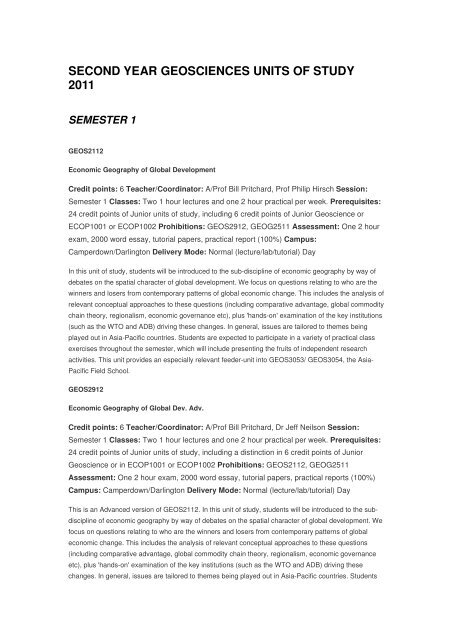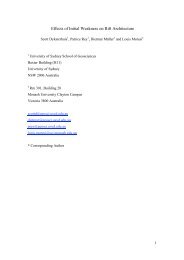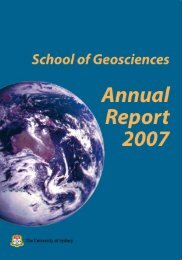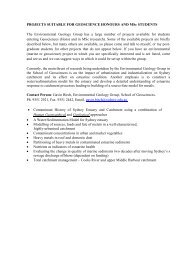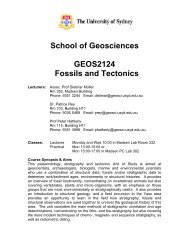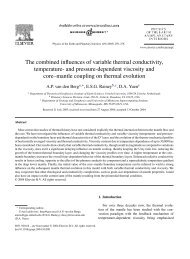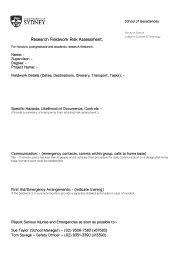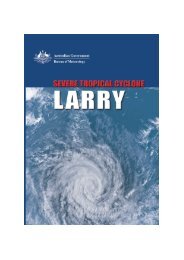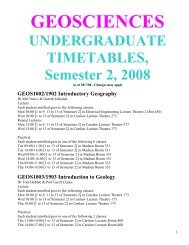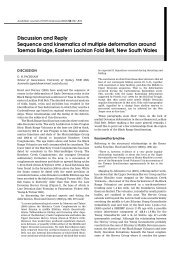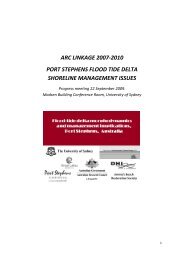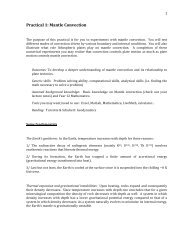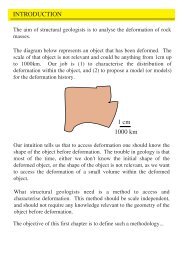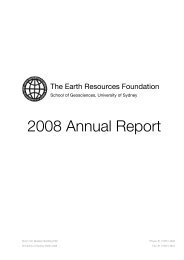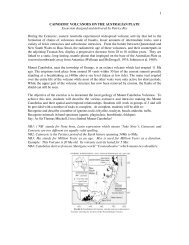second year geosciences units of study 2011 - School of Geosciences
second year geosciences units of study 2011 - School of Geosciences
second year geosciences units of study 2011 - School of Geosciences
You also want an ePaper? Increase the reach of your titles
YUMPU automatically turns print PDFs into web optimized ePapers that Google loves.
SECOND YEAR GEOSCIENCES UNITS OF STUDY<br />
<strong>2011</strong><br />
SEMESTER 1<br />
GEOS2112<br />
Economic Geography <strong>of</strong> Global Development<br />
Credit points: 6 Teacher/Coordinator: A/Pr<strong>of</strong> Bill Pritchard, Pr<strong>of</strong> Philip Hirsch Session:<br />
Semester 1 Classes: Two 1 hour lectures and one 2 hour practical per week. Prerequisites:<br />
24 credit points <strong>of</strong> Junior <strong>units</strong> <strong>of</strong> <strong>study</strong>, including 6 credit points <strong>of</strong> Junior Geoscience or<br />
ECOP1001 or ECOP1002 Prohibitions: GEOS2912, GEOG2511 Assessment: One 2 hour<br />
exam, 2000 word essay, tutorial papers, practical report (100%) Campus:<br />
Camperdown/Darlington Delivery Mode: Normal (lecture/lab/tutorial) Day<br />
In this unit <strong>of</strong> <strong>study</strong>, students will be introduced to the sub-discipline <strong>of</strong> economic geography by way <strong>of</strong><br />
debates on the spatial character <strong>of</strong> global development. We focus on questions relating to who are the<br />
winners and losers from contemporary patterns <strong>of</strong> global economic change. This includes the analysis <strong>of</strong><br />
relevant conceptual approaches to these questions (including comparative advantage, global commodity<br />
chain theory, regionalism, economic governance etc), plus 'hands-on' examination <strong>of</strong> the key institutions<br />
(such as the WTO and ADB) driving these changes. In general, issues are tailored to themes being<br />
played out in Asia-Pacific countries. Students are expected to participate in a variety <strong>of</strong> practical class<br />
exercises throughout the semester, which will include presenting the fruits <strong>of</strong> independent research<br />
activities. This unit provides an especially relevant feeder-unit into GEOS3053/ GEOS3054, the Asia-<br />
Pacific Field <strong>School</strong>.<br />
GEOS2912<br />
Economic Geography <strong>of</strong> Global Dev. Adv.<br />
Credit points: 6 Teacher/Coordinator: A/Pr<strong>of</strong> Bill Pritchard, Dr Jeff Neilson Session:<br />
Semester 1 Classes: Two 1 hour lectures and one 2 hour practical per week. Prerequisites:<br />
24 credit points <strong>of</strong> Junior <strong>units</strong> <strong>of</strong> <strong>study</strong>, including a distinction in 6 credit points <strong>of</strong> Junior<br />
Geoscience or in ECOP1001 or ECOP1002 Prohibitions: GEOS2112, GEOG2511<br />
Assessment: One 2 hour exam, 2000 word essay, tutorial papers, practical reports (100%)<br />
Campus: Camperdown/Darlington Delivery Mode: Normal (lecture/lab/tutorial) Day<br />
This is an Advanced version <strong>of</strong> GEOS2112. In this unit <strong>of</strong> <strong>study</strong>, students will be introduced to the subdiscipline<br />
<strong>of</strong> economic geography by way <strong>of</strong> debates on the spatial character <strong>of</strong> global development. We<br />
focus on questions relating to who are the winners and losers from contemporary patterns <strong>of</strong> global<br />
economic change. This includes the analysis <strong>of</strong> relevant conceptual approaches to these questions<br />
(including comparative advantage, global commodity chain theory, regionalism, economic governance<br />
etc), plus 'hands-on' examination <strong>of</strong> the key institutions (such as the WTO and ADB) driving these<br />
changes. In general, issues are tailored to themes being played out in Asia-Pacific countries. Students
are expected to participate in a variety <strong>of</strong> practical class exercises throughout the semester, which will<br />
include presenting the fruits <strong>of</strong> independent research activities. This unit provides an especially relevant<br />
feeder-unit into GEOS3053/ GEOS3054, the Asia-Pacific Field <strong>School</strong>.<br />
GEOS2114<br />
Volcanoes, Hot Rocks and Minerals<br />
Credit points: 6 Teacher/Coordinator: Dr Derek Wyman, Dr Patrice Rey Session:<br />
Semester 1 Classes: Two 1 hour lectures and one 3 hour practical per week. Prerequisites:<br />
One <strong>of</strong> (GEOG1001, GEOL1001, GEOL1002, GEOS1003, GEOS1903, ENVI1002,<br />
GEOL1902, GEOL1501) and 24 credit points <strong>of</strong> Junior Science <strong>units</strong> <strong>of</strong> <strong>study</strong>. Prohibitions:<br />
GEOL2111, GEOL2911, GEOS2914 Assessment: One 2 hour exam, practical reports, field<br />
trip report (100%) Campus: Camperdown/Darlington Delivery Mode: Normal<br />
(lecture/lab/tutorial) Day<br />
This unit <strong>of</strong> <strong>study</strong> relates plate tectonics to a) volcanoes and magma systems that create them; b) the<br />
formation <strong>of</strong> precious metal and gemstone ores around the Pacific Rim; and c) an understanding <strong>of</strong> how<br />
Earth's materials (minerals, rocks, rock formations, lithospheric plates etc.) respond to stresses and the<br />
forces that deform them. Methods <strong>of</strong> analysis involve studies at the microscopic scale (performed on<br />
thin sections) and the mesoscopic scale performed on hand specimens and outcrops. The unit includes<br />
a two to three day field trip to <strong>study</strong> an extinct volcano in NSW. Practical work includes independent<br />
<strong>study</strong> <strong>of</strong> igneous systems, rocks and minerals employing both microscope-based techniques and<br />
computer modeling. The unit provides relevant knowledge for GEOS3006/3906 - Mineral Deposits and<br />
Spatial Data Analysis.<br />
GEOS2914<br />
Volcanoes, Hot Rocks and Minerals Adv<br />
Credit points: 6 Teacher/Coordinator: Dr Derek Wyman, Dr Patrice Rey Session:<br />
Semester 1 Classes: Two 1 hour lectures and one 3 hour practical per week. Prerequisites:<br />
24 credit points <strong>of</strong> Junior Science <strong>units</strong> <strong>of</strong> <strong>study</strong> and Distinction in one <strong>of</strong> GEOL1002 or<br />
GEOS1002 or ENVI1002 or GEOL1501 or GEOL1902 or GEOS1902 or GEOS1003 or<br />
GEOS1903.This requirement may be varied and students should consult the unit <strong>of</strong> <strong>study</strong><br />
coordinator. Prohibitions: GEOL2001, GEOS2114 Assessment: One 2 hour exam, practical<br />
reports, field trip report Campus: Camperdown/Darlington Delivery Mode: Normal<br />
(lecture/lab/tutorial) Day<br />
This unit has the same objectives as GEOS2114 and is suitable for students who wish to pursue<br />
aspects <strong>of</strong> the subject in greater depth. Entry is restricted and selection is made from the applicants on<br />
the basis <strong>of</strong> their performance to date. Students that elect to take this unit will participate in alternatives<br />
to some aspects <strong>of</strong> the standard unit and will be required to pursue independent work to meet unit<br />
objectives. This unit may be taken as part <strong>of</strong> the BSc (Advanced).<br />
Textbooks<br />
No required textbook. Course notes available.<br />
GEOS2115
Oceans, Coasts and Climate Change<br />
Credit points: 6 Teacher/Coordinator: Dr Joanne Whittaker; A/Pr<strong>of</strong> Patrice Rey, Dr Maria<br />
Seton; Dr Jody Webster Session: Semester 1 Classes: 26 one-hour lectures, 6 one hour<br />
workshops, 1 four hour field work, 6 two hour practical classes. Prerequisites: 48 credit<br />
points from Junior Units <strong>of</strong> Study Prohibitions: GEOS2915, MARS2006 Assumed<br />
knowledge: At least one <strong>of</strong> (GEOG1001, GEOL1001, GEOL1002, GEOS1003, GEOS1903,<br />
ENVI1002, GEOL1902, GEOL1501) Assessment: Web-based on-line reports (30%). One<br />
lab report (20%). One 2-hour exam (50%) Campus: Camperdown/Darlington Delivery Mode:<br />
Normal (lecture/lab/tutorial) Day<br />
This unit <strong>of</strong> <strong>study</strong> introduces core concepts about how the formation <strong>of</strong> ocean basins and their influence<br />
on climate govern the development <strong>of</strong> coasts and continental margins, and related environmental<br />
processes responsible for physical hazards. These concepts provide a framework for understanding the<br />
geographic variation <strong>of</strong> coasts, continental shelves and sediment accumulations in the deep ocean.<br />
Ocean-basin evolution is explained in terms <strong>of</strong> movements within the Earth's interior and how these<br />
movements determine the geometry <strong>of</strong> ocean basins, and their alpine counterparts, which interact with<br />
the global circulation <strong>of</strong> the ocean and atmosphere. Affects <strong>of</strong> this interaction on energy regimes and<br />
hydrology are described in accounting for regional controls that govern supply and dispersal <strong>of</strong><br />
sediments on continental margins and in ocean basins. These controls also govern environmental<br />
conditions determining development <strong>of</strong> coral reefs and other ecosystems that play a key role in marine<br />
sedimentation. The Unit <strong>of</strong> Study systematically outlines how these factors have played out with climate<br />
change to produce by gradual change the coasts we see today, as well as the less familiar deposits<br />
hidden beneath the sea and coastal lands. These gradual changes are compared to the sudden effects<br />
<strong>of</strong> more catastrophic geophysical events. The Unit thereby outlines how knowledge <strong>of</strong> responses to<br />
climate change in the past allow us to predict environmental responses to accelerated climate change<br />
occurring now and in the future due to the industrial greenhouse effect, but places these responses into<br />
perspective against natural hazards that already occur. Overall therefore, the Unit aims to provide<br />
familiarity with fundamental phenomena central to the <strong>study</strong> <strong>of</strong> marine geoscience and environmental<br />
impacts, introduced through process-oriented explanations. The Unit <strong>of</strong> Study is structure around<br />
problem-based project work, for which lectures provide the theoretical background.<br />
Textbooks<br />
On line reading material provided via Fisher Library<br />
GEOS2915<br />
Oceans, Coasts and Climate Change (Adv)<br />
Credit points: 6 Teacher/Coordinator: Dr Ana Vila Conjeco. Session: Semester 1<br />
Classes: 26 x 1 hour lectures, 7 two hour practical classes, 4 x 1 hour workshops, 1 x 4 hour<br />
field work Prerequisites: Distinction average in 48 credit points from Junior <strong>units</strong> <strong>of</strong> <strong>study</strong><br />
Prohibitions: GEOS2115, MARS2006 Assumed knowledge: (GEOG1001, GEOL1001,<br />
GEOL1002, GEOS1003, GEOS1903, ENVI1002, GEOL1902, GEOL1501) Assessment:<br />
Field <strong>School</strong> Report (20%), Field and Lab report (45%), 2 web based online reports (15%),<br />
one 1 hour exam: subset <strong>of</strong> GEOS2115 (20%) Campus: Camperdown/Darlington Delivery<br />
Mode: Normal (lecture/lab/tutorial) Day
This unit has the same objectives as GEOS2115 and is suitable for students who wish to<br />
pursue aspects <strong>of</strong> the subject in greater depth. Entry is restricted and selection is made from<br />
the applicants on the basis <strong>of</strong> their performance to date. Students who elect to take this unit<br />
will participate in alternatives to some aspects <strong>of</strong> the standard unit and will be required to<br />
pursue independent work to meet unit objectives.<br />
Textbooks<br />
Online reading materials are provided via Fisher Library.<br />
SEMESTER 2<br />
GEOG2321<br />
Fluvial and Groundwater Geomorphology<br />
Credit points: 6 Teacher/Coordinator: Dr Willem Vervoot and others Session: Semester 2<br />
Classes: Two 1 hour lectures and one 2 hour practical per week. Prerequisites: 24 credit<br />
points <strong>of</strong> Junior <strong>units</strong> <strong>of</strong> <strong>study</strong> including 6 credit points <strong>of</strong> Junior Geoscience. Students in the<br />
BEnvSys should have ENSY1001, 12 credit points <strong>of</strong> Chemisty, 6 credit points <strong>of</strong> Biology,<br />
BIOM1003 or ENVX2001 Prohibitions: GEOG2002, GEOG2302, GEOG2303, MARS2002,<br />
MARS2006 Assessment: One 2 hr exam, two quizzes, one field report, practical exercises<br />
(100%) Campus: Camperdown/Darlington Delivery Mode: Normal (lecture/lab/tutorial) Day<br />
This unit <strong>of</strong> <strong>study</strong> provides an introduction to the fundamentals <strong>of</strong> fluvial geomorphology (the <strong>study</strong> <strong>of</strong><br />
surface water as an agent <strong>of</strong> landscape change) and groundwater hydrology. The fluvial geomorphology<br />
section <strong>of</strong> the unit will describe the movement <strong>of</strong> water in stream channels and investigate the<br />
landscape change associated with that movement. Topics to be covered will include open channel flow<br />
hydraulics, sediment transport processes and stream channel morphology. Practical work will focus on<br />
the collection and analysis <strong>of</strong> field data. The quantity and quality <strong>of</strong> the groundwater resources are<br />
closely linked to geology and fluvial geomorphology. The groundwater section <strong>of</strong> this unit is based<br />
around four common groundwater issues: contamination, extraction, dryland salinity and groundwatersurface<br />
water interaction. In the practical component, common groundwater computer models such as<br />
FLOWTUBE and MODFLOW will be used to further explore these problems.<br />
Textbooks<br />
Recommended Textbooks: Fetter, CW. Applied Hydrogeology. Prentice-Hall. 2001. Knighton,<br />
D. Fluvial Forms and Processes. Hodder-Arnold. 1998.<br />
GEOS2121<br />
Environmental and Resource Management<br />
Credit points: 6 Teacher/Coordinator: Dr Dan Penny Session: Semester 2 Classes: Two<br />
1 hour lectures per week, 6 one hour tutorials and 6 two hour practical, one fieldtrip.<br />
Prerequisites: 24 credit points <strong>of</strong> junior <strong>units</strong> <strong>of</strong> <strong>study</strong>, including 6 credit points <strong>of</strong> Junior
Geoscience or ECOP1001 or ECOP1002 Prohibitions: GEOG2421, GEOL2202, GEOS2921<br />
Assessment: One 2 hour exam, two tutorial/practical class papers, one fieldtrip report, one<br />
lab report (100%) Campus: Camperdown/Darlington Delivery Mode: Normal<br />
(lecture/lab/tutorial) Day<br />
This unit <strong>of</strong> <strong>study</strong> explores cultural constructions <strong>of</strong> nature and resources, the evolution <strong>of</strong> environmental<br />
thought and the debates about sustainable development and climate change. It integrates<br />
environmental, economic, cultural and social considerations in respect to natural resource management<br />
in Australia and across Southeast Asia. The environmental considerations extend to an understanding<br />
<strong>of</strong> climatic responses over the long term that provide constraints on resource management today, and<br />
how these responses are projected to vary in future. These environmental constraints include air, land,<br />
vegetation and water resources and are examined in relation to current issues driving contemporary<br />
debate on the politics <strong>of</strong> climate change that must now be considered in environmental management<br />
and competition for resources. The principles are brought to life through a fieldtrip to the Hunter Valley<br />
to look at geographical issues pertaining to mines, wines and the thoroughbred breeding industries in<br />
this region. The unit <strong>of</strong> <strong>study</strong> enables students to learn about the social, cultural and environmental<br />
considerations that must be taken into account when developing and implementing environmental and<br />
resource management policies in climate-change society.<br />
GEOS2921<br />
Environmental & Resource Management Adv<br />
Credit points: 6 Teacher/Coordinator: Dr Yayoi Lagerqvist Session: Semester 2 Classes:<br />
Two 1 hour lectures, one 1 hour tutorial per week and one fieldtrip. Prerequisites: 24 credit<br />
points <strong>of</strong> Junior <strong>units</strong> <strong>of</strong> <strong>study</strong>, including a distinction in 6 credit points <strong>of</strong> Junior Geoscience or<br />
in ECOP1001 or ECOP1002. This requirement may be varied and students should consult<br />
the unit <strong>of</strong> <strong>study</strong> coordinator. Prohibitions: GEOG2421, GEOL2202, GEOS2121<br />
Assessment: One 2 hour exam, one media report, one tutorial / practical class paper, one<br />
fieldtrip report (100%) Campus: Camperdown/Darlington Delivery Mode: Normal<br />
(lecture/lab/tutorial) Day<br />
Advanced students will complete the same core lecture materials as for GEOS2121 but are<br />
required to complete alternative tutorial or practical work and an essay in place <strong>of</strong> the regular<br />
tutorial reports prepared in GEOS2121.<br />
GEOS2122<br />
Urban Geography<br />
Credit points: 6 Teacher/Coordinator: Dr Kurt Iveson Session: Semester 2 Classes: 1 two<br />
hour lecture and one 1 hour tutorial per week. Prerequisites: 24 credit points <strong>of</strong> Junior <strong>units</strong><br />
<strong>of</strong> <strong>study</strong>, including 6 credit points <strong>of</strong> Junior Geoscience or ECOP1001 or ECOP1002.<br />
Prohibitions: GEOS2922, GEOG2521 Assessment: One 90 minute exam, one in class test,<br />
one 2000 word essay, tutorial papers (100%) Campus: Camperdown/Darlington Delivery<br />
Mode: Normal (lecture/lab/tutorial) Day
By their very nature, cities are intense assemblages <strong>of</strong> different people doing all sorts <strong>of</strong><br />
different things. For this reason, urban geographies are highly dynamic. Urban inhabitants<br />
engaged in different activities use urban space in different ways, and in the process they<br />
continually remake their cities. Inevitably, different uses and users <strong>of</strong> urban spaces<br />
sometimes come into conflict with each other and with the urban authorities who try to shape<br />
and regulate cities. This Unit <strong>of</strong> Study aims to understand some <strong>of</strong> these dynamic urban<br />
geographies, primarily (but not exclusively) in western cities. We will do this by thinking<br />
critically about urban places and practices that we <strong>of</strong>ten take for granted. As we will see, we<br />
can learn a lot about processes <strong>of</strong> urban change by considering apparently ‘everyday’ things<br />
like going to the shopping mall, eating out, driving, skateboarding, using mobile phones and<br />
computers, policing, participating in a protest or a religious ceremony … even hopping in a lift!<br />
GEOS2922<br />
Urban Geography (Advanced)<br />
Credit points: 6 Teacher/Coordinator: Pr<strong>of</strong> John Connell, Dr Kurt Iveson Session:<br />
Semester 2 Classes: one 2 hour lecture and one 1 hour tutorial per week. Prerequisites: 24<br />
credit points <strong>of</strong> Junior <strong>units</strong> <strong>of</strong> <strong>study</strong>, including a distinction in 6 credit points <strong>of</strong> Junior<br />
Geoscience or in ECOP1001 or ECOP1002 Prohibitions: GEOS2122 Assessment: One 90<br />
minute exam, one in-class test, one 2000 word essay, tutorial papers (100%) Campus:<br />
Camperdown/Darlington Delivery Mode: Normal (lecture/lab/tutorial) Day<br />
The advanced option for this Unit <strong>of</strong> Study will involve a more substantial field-based<br />
assessment, which will be developed in consultation with the students.<br />
GEOS2124<br />
Fossils and Tectonics<br />
Credit points: 6 Teacher/Coordinator: Dr Adriana Dutkiewicz (coordinator), A/Pr<strong>of</strong> Patrice<br />
Rey Session: Semester 2 Classes: Two 1 hour lectures plus one 2 hour practical each<br />
week. Prerequisites: 24 credit points <strong>of</strong> Junior <strong>units</strong> <strong>of</strong> <strong>study</strong>, including GEOS1003 or<br />
GEOS1903 or GEOL1002 or GEOL1902 or GEOL1501 Prohibitions: GEOS2924,<br />
GEOL2123, GEOL2124 Assessment: One 2 hour exam, practical reports, field report (100%)<br />
Campus: Camperdown/Darlington Delivery Mode: Normal (lecture/lab/tutorial) Day<br />
The unit aims to convey how fossils, stratigraphic and structural data are used together to determine<br />
ages and environments and the deformation history <strong>of</strong> rock layers. It covers an introduction to historical<br />
geology and the evolution <strong>of</strong> the major fossils groups. Methods <strong>of</strong> stratigraphic age determination<br />
include litho-, bio-, chemo-, magneto- stratigraphy, as well as radiometric geochronology and the<br />
stratigraphic characteristics <strong>of</strong> the main geological time intervals. Structural methods are focused on<br />
brittle deformation in the upper crust and sediments. Students will gain familiarity with the most<br />
important fossil groups and how to identify them, and with the most important types <strong>of</strong> faults and folds.<br />
The formation <strong>of</strong> fossil fuels such as coal, oil and gas will also be covered in an earth history and
esource exploration context. The simultaneous use <strong>of</strong> fossils, stratigraphy and structure to unravel the<br />
geological history <strong>of</strong> a set <strong>of</strong> exposed rock layers is demonstrated during a field excursion to Yass.<br />
Textbooks<br />
Class notes will be available for purchase from The University Copy Centre<br />
GEOS2924<br />
Fossils and Tectonics (Advanced)<br />
Credit points: 6 Teacher/Coordinator: Dr Adriana Dutkiewicz (co-ordinator), A/Pr<strong>of</strong> Patrice<br />
Rey Session: Semester 2 Classes: Two 1 hour lectures plus one 2 hour practical each<br />
week. Prerequisites: Distinction in GEOS1003 or Distinction average in 12 credit points <strong>of</strong><br />
Junior Geoscience <strong>units</strong> (Geoscience is the disciplines <strong>of</strong> Geography, Geologyand<br />
Geophysics) Prohibitions: GEOS2124, GEOL2123, GEOL2124 Assessment: One 2 hour<br />
exam, practical reports, field report (100%) Campus: Camperdown/Darlington Delivery<br />
Mode: Normal (lecture/lab/tutorial) Day<br />
This unit has the same objectives as GEOS2124 and is suitable for students who wish to pursue<br />
aspects <strong>of</strong> the subject in greater depth. Entry is restricted and selection is made from the applicants on<br />
the basis <strong>of</strong> their performance to date. Students that elect to take this unit will participate in alternatives<br />
to some aspects <strong>of</strong> the standard unit and will be required to pursue independent work to meet unit<br />
objectives. This unit may be taken as part <strong>of</strong> the BSc (Advanced).<br />
Textbooks<br />
Class notes will be available for purchase from The University Copy Centre


